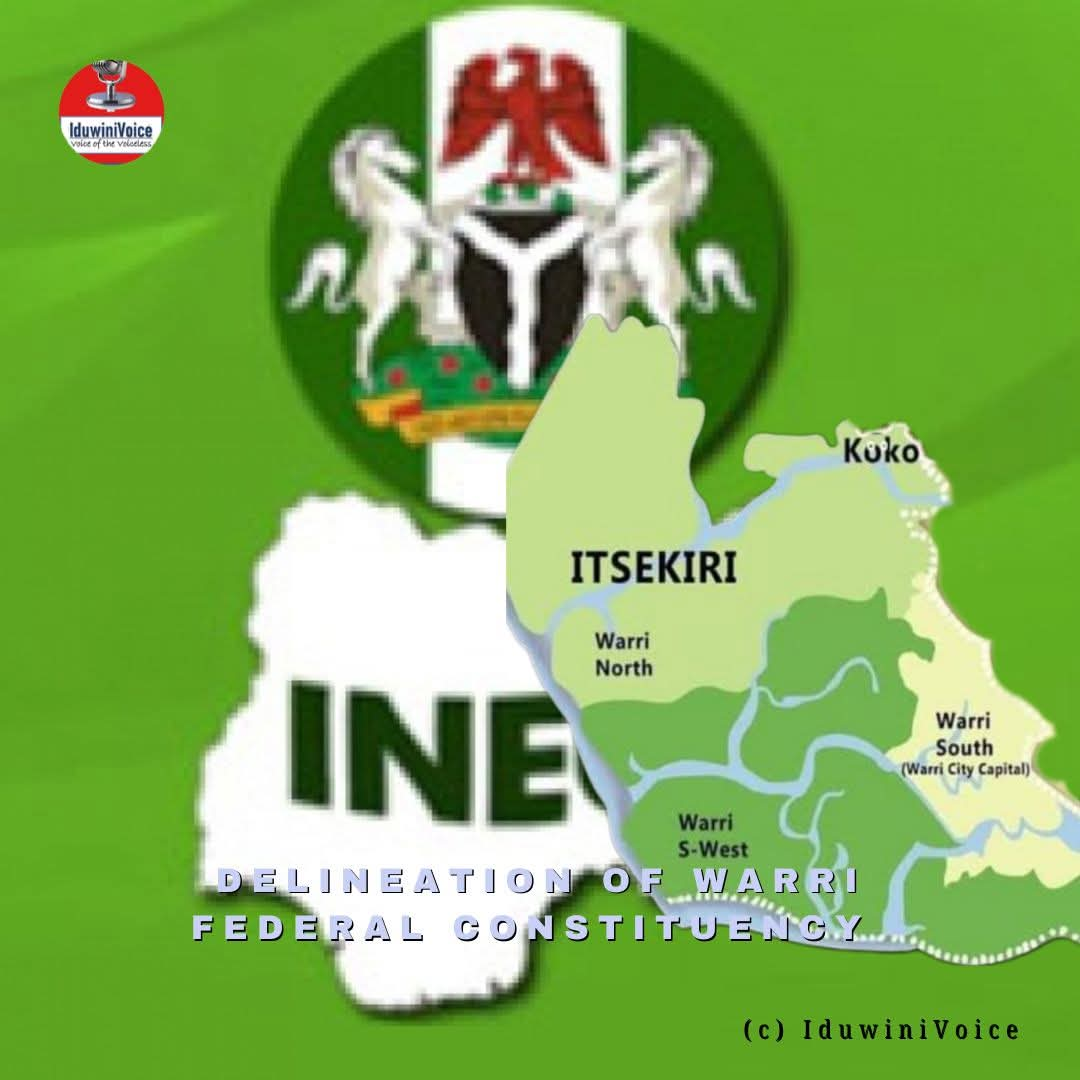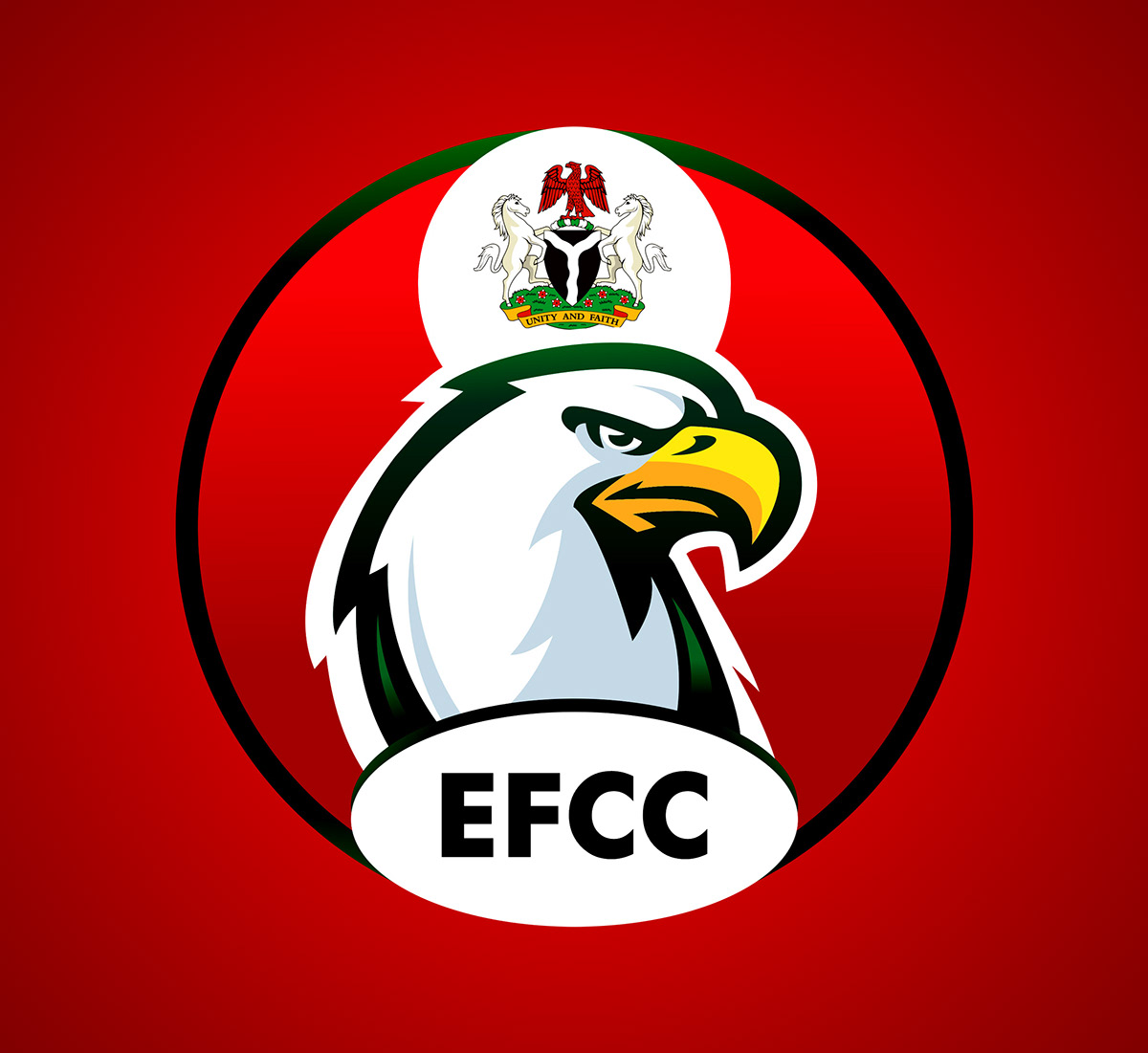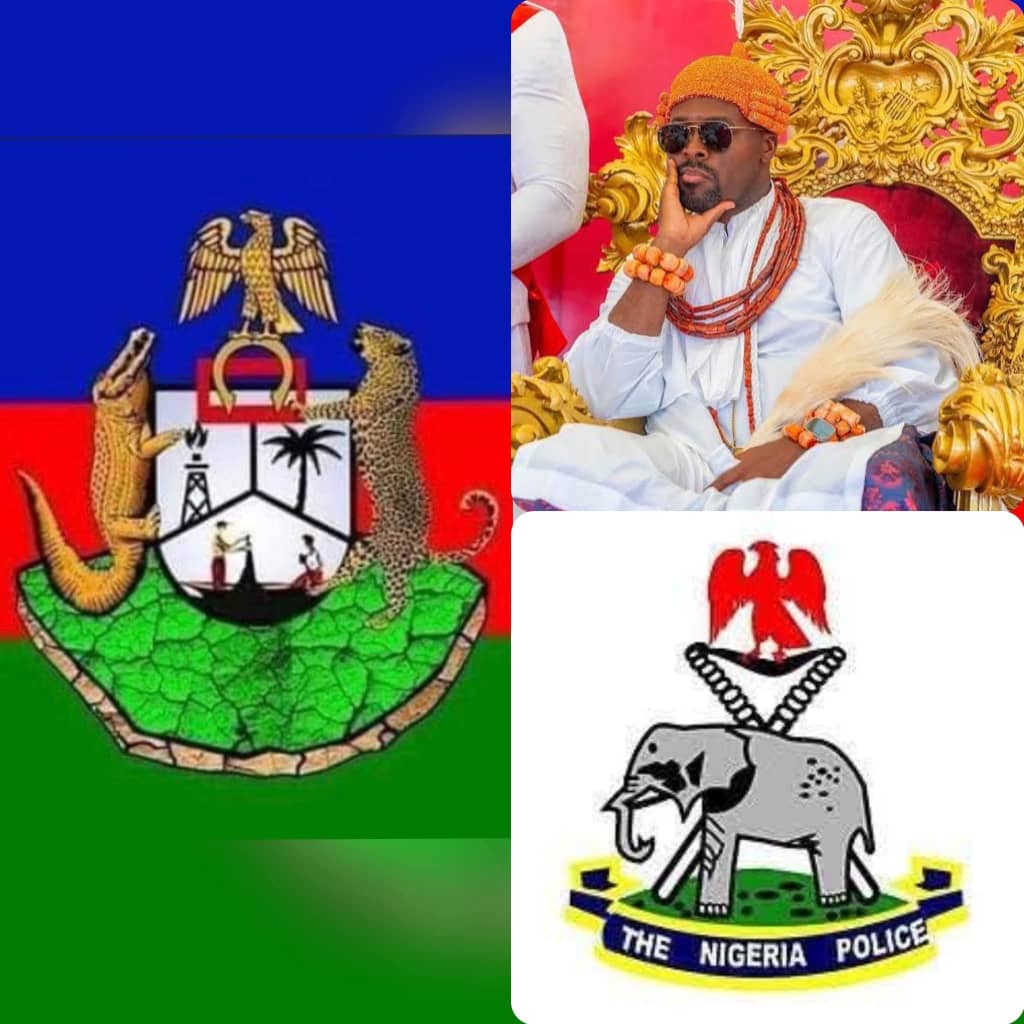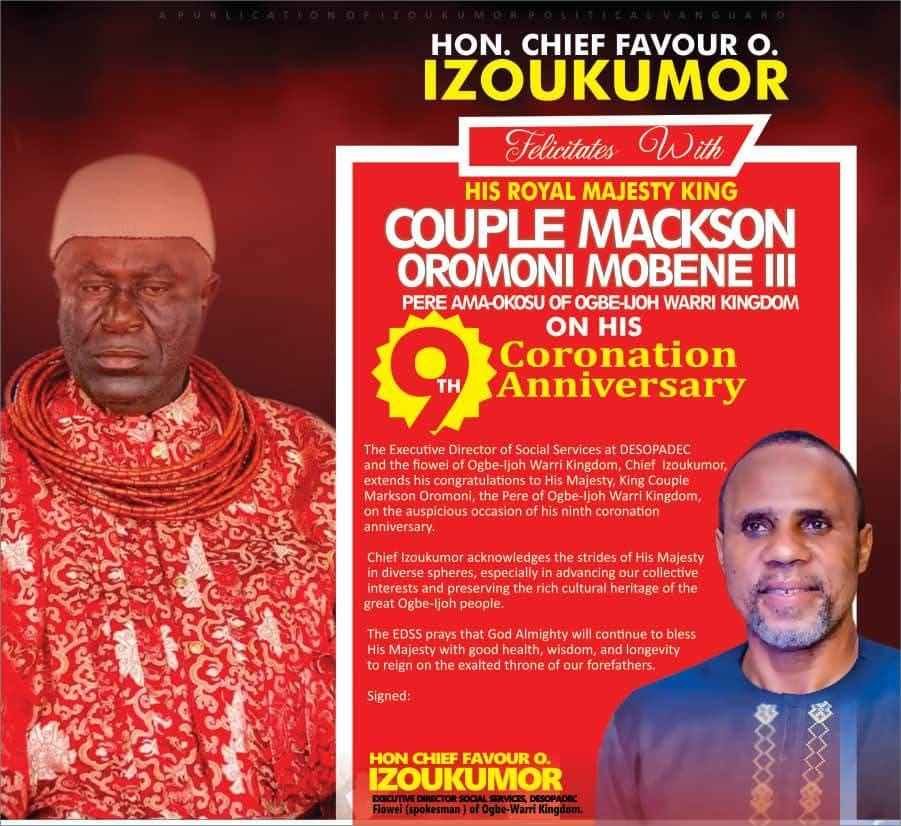Open Letter
OPEN LETTER TO INEC, THE FEDERAL GOVERNMENT, AND THE INTERNATIONAL COMMUNITY: RE: INEC’S DELAY IS NOT NEUTRAL, IT IS POLITICAL VIOLENCE AGAINST THE IJAWS & URHOBO OF WARRI FEDERAL CONSTITUENCY

NIGER DELTA PEOPLE’S DEVELOPMENT (NDPD)
OPEN LETTER TO INEC, THE FEDERAL GOVERNMENT, AND THE INTERNATIONAL COMMUNITY:
Date: [12/8/2025]
RE: INEC’S DELAY IS NOT NEUTRAL, IT IS POLITICAL VIOLENCE AGAINST THE IJAWS & URHOBO OF WARRI FEDERAL CONSTITUENCY
1. INTRODUCTION
For more than a century, the story of Warri has been one of systematic injustice, carved into maps and sealed into laws that never reflected the truth. From the deceitful surveys of 1895 to the manipulated ward structures of the post-colonial era, the Ijaw and Urhobo peoples have been subjected to political dispossession and demographic distortion. We have watched our lands and waterways expropriated under fraudulent arrangements that favoured a smaller ethnic group, while our majority status was deliberately hidden behind fabricated figures.
Today, the Independent National Electoral Commission (INEC) holds the Supreme Court ordered final delineation result for Warri Federal Constituency. This document is not simply administrative paperwork, it is a historic opportunity to correct a century-old injustice. Yet every day it remains concealed, the ghost of colonial fraud walks freely in our politics, whispering to the powerful that oppression can still be made permanent. This delay is not an innocent oversight, it is an extension of the same deception that has kept our people politically marginalised.
2. HISTORICAL CONTEXT
The imbalance we face today was conceived in colonial offices, nurtured through fraudulent ward structures and sustained by elite interference in Abuja. The Supreme Court, in Timinimi v. INEC (SC/CV/1033/2023), has spoken with clarity and finality, ordering INEC to release the delineation result.
Colonial records and British intelligence reports leave no room for fabrication:
1935 Warri Province Intelligence Report: “The Itsekiri inhabit scattered riverbank settlements; the great swampy hinterland is occupied predominantly by the Ijaw and Urhobo.”
1948 Benin River District Political Assessment: “Ijaw villages dominate the creeks and waterways south of Warri. Itsekiri presence is minimal outside certain trading points.”
From the 1895 Niger Coast Protectorate Survey to the 1954 Warri Division Boundary Maps, no official record ever placed the entirety of Warri Federal Constituency under Itsekiri ownership. Geography is not subject to political editing; God’s design cannot be altered by cartographic fraud.
3. CURRENT CONCERNS
INEC’s refusal to release the final delineation result before Continuous Voter Registration is not administrative caution, it is political violence. It emboldens those who profit from ethnic tension and electoral imbalance.
The crises of 1997, 1999, and 2003 all share the same root cause, electoral injustice and ward manipulation favouring a politically engineered minority. Human Rights Watch, in its 2003 Niger Delta Report, warned: “Electoral inequity in Warri is not a dormant wound; it is an unhealed injury that can be reopened by administrative bias.”
We reject entirely the insult of being called “tenants” in our own homeland. The Pacheco Pereira account of 1485 and Dutch factory records of 1716 prove Ijaw territorial control decades before any Itsekiri political formation emerged. The colonial court in Ometan v. Chief Dore Numa (1926) affirmed that Itsekiri political authority was restricted to certain defined parcels, never the whole of Warri division.
4. OUR DEMANDS
In the interest of justice, peace and constitutional order, the Niger Delta People’s Development (NDPD) demands the following:
1. Immediate Publication of the Supreme Court Ordered Final Delineation Result for Warri Federal Constituency before the commencement of Continuous Voter Registration (CVR).
2. Full Compliance with the Judgment in Timinimi v. INEC (SC/CV/1033/2023) without manipulation, delay or external interference.
3. Independent Monitoring by ECOWAS, AU and UN to ensure the process is transparent, fair and immune to political sabotage.
4. Federal Government Commitment to Electoral Equity in Warri by dismantling the colonial-era ward structure that artificially favours a minority group over the Ijaw and Urhobo majorities.
5. Public Access to Historical and Cartographic Records relating to Warri’s territorial boundaries to prevent further distortion of history.
CONCLUSION
The delineation result is not simply a legal obligation; it is a peacekeeping necessity and a historical correction. INEC now stands at a defining moment to choose between writing the truth into Nigeria’s electoral history or burying it again for another generation to bleed.
When the liar fears the final pronouncement, it is because the truth will shatter their empire of deceit. We are speaking that truth now. The question is whether INEC will honour it.
Signed:
Chief, Eseoghene Friday
(Chairman)
Elder, Prince Teme-owei
(Secretary)
Niger Delta People’s Development (NDPD)
Cc:
The President of the Federal Republic of Nigeria
The National Security Adviser (NSA)
The Chairman, Independent National Electoral Commission (INEC)
The Secretary-General, United Nations (UN)
The Chairperson, African Union (AU)
The President, Economic Community of West African States (ECOWAS)
The European Union Delegation to Nigeria
The United States Embassy, Abuja
The British High Commission, Abuja
Open Letter
AN OPEN LETTER: A WAKE UP CALL TO EFCC ON DELTA STATE’S MISSING N1.3 TRILLION 13% OIL DERIVATION FUNDS

20th October, 2025.
The Chairman
Economic and Financial Crime Commission (EFCC)
Headquarters
FCT-ABUJA
Dear Sir,
AN OPEN LETTER: A WAKE UP CALL TO EFCC ON DELTA STATE’S MISSING N1.3 TRILLION 13% OIL DERIVATION FUNDS
This open letter arises from the continued silence by the Economic and Financial Crimes Commission (EFCC) on the N1.3 trillion of the Delta State Oil Producing Areas Development Commission’s (DESOPADEC) funds that was unlawfully diverted by the former governor of Delta State, Sen. Dr. Arthur Ifeanyi Okowa, during his eight year tenure (2014–2023).
It would be recalled that the Mr. Ola Olukoyede-led EFCC had through its Port Harcourt Directorate operatives arrested the former governor in November 2024 over the alleged diversion of the N1.3 trillion, being proceeds of the 13 per cent derivation fund that accrued to the State during his eight-year tenure. In addition to this, was another unaccounted N40 billion he used to acquire shares in one of the major banks in the country representing eight per cent equity to float the offshore UTM Floating Liquefied Natural Gas.
Prior to Okowa’s arrest, representatives of oil and gas producing communities in the State, precisely on Thursday, June 22, 2023, beseeched the headquarters of the EFCC in Abuja in protest against the alleged misappropriation of the 13 per cent oil derivation fund by Okowa that belongs to the oil bearing communities and was meant for its rehabilitation and development. The said N1.3 trillion was from the 50% per cent legally prescribed allocation to DESOPADEC from the 13 per cent oil derivation fund, which the governor, through a holding account, utilised to deprive the oil-bearing communities.
During our protest, we submitted a copy of our petition on the issue to the EFCC, as was signed by representatives of the various ethnic nationalities among whom are: Chief Mulade Sheriff (representative of Ijaw Ethnic Nationality); Matthew Itsekure (Itsekiri Ethnic Nationality); Mr Osita Ijoma/Patience. A Ego (Ndokwa Ethnic Nationality); Mark Ikpuri (Urhobo Ethnic Nationality); and Chief John Etenero (Isoko Ethnic Nationality).
For the records, we would like to also state that Okowa’s premeditated action to siphon DESOPADEC’s funds began when, as governor, stampeded the State House of Assembly to change the law setting up the Commission through an executive bill which was read, deliberated on and passed in a single day, in August 2018 to deliberately include his communities as hosts in the commission.
We had appealed to the anti-graft agency to conduct a comprehensive probe of the former governor’s administration, particularly the 13 per cent oil derivation funds that accrued and were disbursed to the State between 2015 and 2023 when Okowa was governor. Unfortunately, after his (Okowa’s) arrest and release, nothing has been heard about the EFCC’s investigation. The world is watching!
We would like to remind the anti-graft agency that Deltans and Nigerians are interested to know what the outcome of its investigations are. The comment from the accused that the petition against his alleged diversion of the N1.3 trillion is politically motivated is laughable. It is an attempt to divert attention from the main issue at stake. This money is meant to develop the oil producing communities in Delta State that continue to suffer neglect of infrastructures and compensation for the loss of fishing rights among others.
The EFCC’s continued silence calls for concern, particularly from the oil bearing communities who are the victims of this cruelty by Okowa. The EFCC’s silence has prompted us to raise some likely questions such as:
i.) Is it because the sitting governor, Chief (Elder) Sheriff Oborevwori has joined the All Progressives Congress (APC), that is why the EFCC has compromised or halted their investigations?
ii.) Is it because there was an assignment to the former governor that if he could be able to woo the Delta State government to join the APC, then his ‘sins’ would be forgiven? It seems that it is a slogan that when you join the APC, your sins are forgiven!
iii) What message is the EFCC’s silence or inaction on the missing funds sending to Deltans and Nigerians? Are they encouraging others to loot, so that when they finish looting, they can move to the ruling party at the federal level and go scot-free? Is it a precedent that EFCC wants to set for Nigerians for the next generation to follow?
v) Is it a confirmation and truth that EFCC is a barking dog without teeth to bit because of political interference said by former President Olusegun Obasanjo?.
Quoting Olorogun Stephen K. Dieseruvwe from Bradford City, UK, “Without gainsaying, the utilization of the 13% Derivation Fund is meant for the development of oil producing communities. Based on the DESOPADEC Law, the state withholds 50%, and the other 50% meant for DESOPADEC was not fully disbursed in the eight years of Governor Okowa. It should be made abundantly clear that the governors in receipt of the 13% Derivation Fund, by law, do not have the right or prerogative to utilize the funds as they deem fit. If they do so, it will amount to misappropriation and mismanagement of the fund specifically meant for the development of oil producing communities. Without the oil exploration and exploitation from those communities, Delta State wouldn’t be one of the beneficiaries of the 13% Derivation Fund and would only be stuck with the statutory allocation component of FAAC allocations. It is unjust and inhuman to deprive oil producing communities of their rightful entitlement.”
Let me strongly appeal and charge the current EFCC leadership under Mr Olukayode to emulate the good legacies of former chairman Nuhu Ribadu who is currently enjoying Nigerians good will as National Security Adviser (NSA) under President Bola Ahmed Tinubu GCFR.
We are therefore calling on the EFCC to wake up to its responsibilities as an anti-graft agency. This is a wake up call to the EFCC to act.
A stitch in time, they say, saves nine!
Signed:
Chief (Comrade) Mulade B. Sheriff, PhD
(The Ibe-Sorimowei of Ancient Gbaramatu Kingdom,
Delta State).
Open Letter
POLICE CONNIVING WITH ITSEKIRI TO THREATEN PEACE IN WARRI – IYC

IJAW YOUTH COUNCIL (IYC), WESTERN ZONE
The Ijaw Youth Council (IYC) Western Zone has raised an alarm of the Warri Area Command allegedly conniving with the Itsekiri ethnic nationality to oppress Ijaws in the city.
The alarm is sequel to the removal of banners bearing the image of HRM King Couple Oromoni, the Pere of Ogbe-Ijoh Warri Kingdom, by Itsekiri youths, in company of police officers from the command.
The development sparked protests by Ijaw youths, who marched to the Area Command demanding the retrieval of the banners and their immediate replacement.
Reacting to the incident, the Ijaw Youth Council (IYC) Western Zone, in a statement signed by the trio of Nicholas Tamaradenyefa Igarama – Chairman, Ebi Joshua Olowolayemo – Secretary, and Tare Magbei – Information Officer, accused the police of abetting to falsehood and threat to peace in Warri.
The Council fingered the Olu of Itsekiri – Ogiame Atuwatse III and the Warri South Council Chairman- Agbateyiniro Isaac Weyinmi, as masterminds of the condemnable act it described as a decoy to cause war.
“The attention of the Ijaw Youth Council has been drawn to an incident of police officers attached to the Warri Area Command conniving with the Itsekiri ethnic nationality to remove banners bearing the image of HRM Couple Oromoni, the revered king of Ogbe-Ijoh Kingdom.
“This condemnable act is masterminded by one Wayemi Agas, the Warri South Council Chairman, who perpetrated the act on the others of the Itsekiri hierarchy.
“As peace-loving and law-abiding citizens, we view this action as a direct provocation and a calculated attempt to ignite ethnic tension in Warri. The removal of our king’s image is not only an insult to the Ogbe-Ijoh Kingdom but also a violation of the fragile peace that stakeholders have struggled to sustain in the area.
“We call on the Delta State Government, security agencies, and well-meaning Nigerians to prevail on the Warri South Council Chairman and the Itsekiri leadership to desist from further acts capable of undermining peace.
“The Ogbe-Ijoh Kingdom has consistently maintained peaceful relations with its neighbors, despite repeated provocations. We will not be forced into conflict, but no one should mistake our commitment to peace as weakness. Any further attempt to desecrate the image or authority of our traditional ruler will be met with stiff resistance.
“We demand a public apology from those responsible and clear assurance from the Warri Area Command that such partiality and connivance will not be repeated.”
Signed
Comrade Nicholas Igarama – Chairman
Ebi Joshua Olowolayemo, Esq. – Secretary
Comrade Tare Magbei
Information Officer
@highlight
Open Letter
OPEN LETTER: THE UNJUST AND DELIBERATE REMOVAL OF THE KING OF OGBE-IJOH WARRI KINGDOM CORONATION BANNERS; A SERIOUS BREACH OF TRUST, CULTURAL RIGHTS AND PUBLIC ORDER

From: Concern Ijaw Stakeholders, Warri Federal Constituency
Date: [16/8/2025]
To:
His Excellency Bola Ahmed Tinubu, GCFR President, Federal Republic of Nigeria.
The Inspector-General of Police, IGP Kayode Adeolu Egbetokun, Ph.D., NPM.
The Delta State Governor.
RE: THE UNJUST AND DELIBERATE REMOVAL OF THE KING OF OGBE-IJOH WARRI KINGDOM CORONATION BANNERS: A SERIOUS BREACH OF TRUST, CULTURAL RIGHTS AND PUBLIC ORDER
Your Excellency, Mr. Inspector-General,
We write with heavy concern but unshaken resolve. It has been credibly reported to us that this morning some elements of the Itsekiri community, assisted and escorted by officers of the Nigeria Police Force, forcibly removed and tore down the coronation banners erected for the King of Ogbe-Ijoh, Warri Kingdom. These banners were cultural emblems, lawful expressions of tradition and communal identity, displayed openly and peacefully. The removal of those banners by persons in police uniform is not a routine enforcement action; it is a partisan, inflammatory act that wounds the dignity of a people and threatens the fragile peace of our constituency.
We are Ijaw people of Warri Federal Constituency. Our presence in Ogbe-Ijoh, Gbaramatu, Egbema, Isaba and neighbouring towns is long-standing and indisputable. We are peace-loving, law-abiding citizens who cherish our traditions and expect the State to protect them equally. To see state security personnel participate in the suppression of our cultural symbols is to watch the instruments of law used to deny the very rights they are sworn to defend.
HISTORICAL & LEGAL CONTEXT
This incident cannot be divorced from the longer history of contested narratives and structural marginalisation in Warri. Over decades, colonial reclassifications and selective administrative conveniences produced distorted perceptions of authority and overlordship. Those historical distortions do not justify contemporary acts of state-backed humiliation. Under our Constitution, the people are sovereign and government exists to secure the rights, safety and dignity of every community. Any state action that privileges one ethnic narrative at the expense of another violates the fundamental compact of the Republic.
CONSTITUTIONAL BREACHES & PRINCIPLES FRAGILE OR IGNORED
By allowing or participating in the removal of the coronation banners, the following core principles are affronted:
• The sovereignty of the people and equality before the law.
• The protection of cultural rights and dignity.
• The duty of security agencies to remain neutral and to protect, not suppress, lawful cultural expression.
We remind the Federal Government and the Nigeria Police that public trust is not granted indefinitely; it is earned and can be withdrawn the moment security agencies become instruments of ethnicity and exclusion.
DEMANDS (IMMEDIATE & NON-NEGOTIABLE)
Accordingly, we demand the following urgent actions to be carried out and publicly confirmed within 72 hours from service of this letter:
1. Immediate restoration of all coronation banners and cultural paraphernalia removed, with guarantees of protection for any forthcoming lawful cultural displays.
2. An open, independent and time-bound investigation (with civilian oversight) into the conduct of the police officers involved, naming units, officers and any collaborators and the prompt publication of the investigative findings.
3. Disciplinary and criminal action against any police personnel found to have acted unlawfully, together with sanctions appropriate to their misconduct.
4. A binding public directive from the Inspector-General of Police reminding all officers in Delta State and the Niger Delta of their oath to impartiality, and ordering the immediate cessation of any partisan policing in chieftaincy, cultural or local governance matters.
5. A Federal Government assurance that the Ijaw, Urhobo and Itsekiri peoples will be treated with equal recognition and protection under the law, and that no community will be allowed to appropriate state power to suppress another.
A CAUTIOUS BUT FIRM WARNING
We are not a people who rush to violence, nor will we ply the highway of unlawful retaliation. Our patience is deliberate and strategic. But patience is not passivity. If the State continues to countenance the use of its instruments to humiliate and dispossess, we will be compelled to pursue all lawful remedies to the fullest: public interest litigation, petitions to oversight institutions, concerted peaceful demonstrations, engagement of national and international human rights mechanisms and the full exposure of any offending personnel and their enablers.
Let the record be clear: we prefer justice over conflict; we prefer dialogue over confrontation. The choice to avoid crisis rests primarily with the Federal Government and the leadership of the Nigeria Police Force. Act now to restore confidence or be prepared to answer to history and to the conscience of the nation.
CLOSING
We call on President Bola Ahmed Tinubu and Inspector-General Kayode Egbetokun to act swiftly, transparently and decisively. Restore our banners. Restore our dignity. Restore the neutrality of the State. Failure to do so will be interpreted not as negligence but as a deliberate siding with oppression, a grave betrayal of the trust reposed in the Federal Government and its security institutions.
Signed,
Chief, Tiemopere Joshua
(President)
Chief, Ebikeme T. Godstime
(Secretary)
Concern Ijaw Stakeholders, Warri Federal Constituency
Cc:
National Security Adviser
Delta State Government
National Human Rights Commission.
National Assembly Committee on Police Affairs
International Human Rights Organisations
National and Local Media Houses
